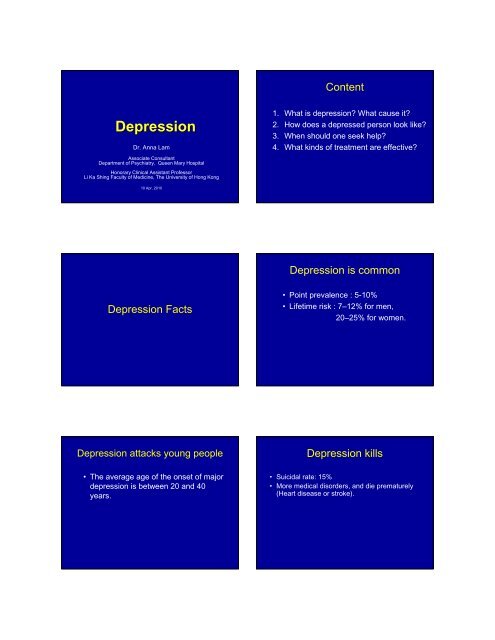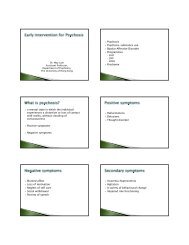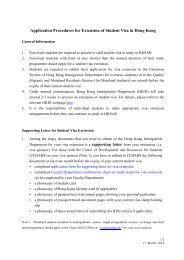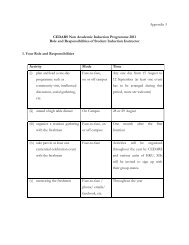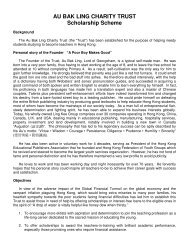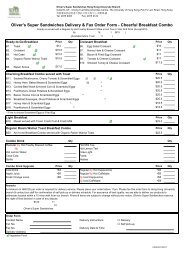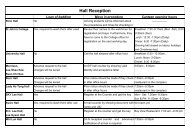Depression - Cedars - The University of Hong Kong
Depression - Cedars - The University of Hong Kong
Depression - Cedars - The University of Hong Kong
Create successful ePaper yourself
Turn your PDF publications into a flip-book with our unique Google optimized e-Paper software.
Content<br />
<strong>Depression</strong><br />
Dr. Anna Lam<br />
Associate Consultant<br />
Department <strong>of</strong> Psychiatry, Queen Mary Hospital<br />
Honorary Clinical Assistant Pr<strong>of</strong>essor<br />
Li Ka Shing Faculty <strong>of</strong> Medicine, <strong>The</strong> <strong>University</strong> <strong>of</strong> <strong>Hong</strong> <strong>Kong</strong><br />
1. What is depression? What cause it?<br />
2. How does a depressed person look like?<br />
3. When should one seek help?<br />
4. What kinds <strong>of</strong> treatment are effective?<br />
10 Apr, 2010<br />
<strong>Depression</strong> is common<br />
<strong>Depression</strong> Facts<br />
• Point prevalence : 5-10%<br />
• Lifetime risk : 7–12% for men,<br />
20–25% for women.<br />
<strong>Depression</strong> attacks young people<br />
• <strong>The</strong> average age <strong>of</strong> the onset <strong>of</strong> major<br />
depression is between 20 and 40<br />
years.<br />
<strong>Depression</strong> kills<br />
• Suicidal rate: 15%<br />
• More medical disorders, and die prematurely<br />
(Heart disease or stroke).
<strong>Depression</strong> is a world problem<br />
Cause <strong>of</strong> disability worldwide<br />
• Ranked 3 rd worldwide<br />
• Ranked 8 th among low-income countries<br />
• Leading in middle & high-income countries<br />
(2 nd Ischaemic heart disease; 3 rd Cerebrovascular<br />
disease)<br />
<strong>Depression</strong>: leading cause <strong>of</strong> disease burden<br />
among young women worldwide<br />
WHO: <strong>The</strong> global burden <strong>of</strong> disease: 2004 update<br />
WHO: <strong>The</strong> global burden <strong>of</strong> disease: 2004 update<br />
<strong>Depression</strong> is <strong>of</strong>ten missed<br />
• Fewer than 25 % receive treatments.<br />
What is depression?<br />
<strong>Depression</strong> :a Well-defined Medical<br />
illness<br />
• <strong>The</strong> symptoms <strong>of</strong> depression<br />
– are intense and<br />
– are prolonged<br />
• Interfere with the person’s daily activities.<br />
“Functional impairment”<br />
<strong>Depression</strong> :a Well-defined Medical<br />
illness<br />
Run a natural course<br />
• Untreated episodes generally last 6–24 months,<br />
two thirds with spontaneous full recovery.<br />
• Recurrence <strong>of</strong> 25% in one year, 75% in 10 years.<br />
Neurobiological changes <strong>of</strong> brain<br />
• Studies showing changes in brain biochemistry,<br />
endocrine disturbance, cerebral morphology and<br />
physiology in depressed population<br />
WHO Regional Office for South‐East Asia 2009 :Conquering <strong>Depression</strong>
2<br />
Overall brain gray matter<br />
density decline during 3<br />
years in patients with<br />
major depression.<br />
Significant longitudinal<br />
gray matter density<br />
reductions within the<br />
dorsomedial prefrontal<br />
cortex, anterior cingulum,<br />
hippocampus, dorsolateral<br />
prefrontal cortex, and<br />
orbit<strong>of</strong>rontal, temporal,<br />
parietal, and occipital<br />
cortices are shown for<br />
patients with major<br />
depression compared with<br />
controls.<br />
What cause it ?<br />
<strong>Depression</strong>‐related variation in brain morphology over 3 years: effects <strong>of</strong> stress?<br />
Frodl TS et al Archives <strong>of</strong> General Psychiatry. 2008 Oct.<br />
What causes depression?<br />
• <strong>Depression</strong> doesn't have only one cause.<br />
It appears that interaction among genetic,<br />
biochemical, environmental, and<br />
psychosocial factors may play a role.<br />
Risk Factors For <strong>Depression</strong><br />
Biological<br />
• genes, gender, physical health, drug use<br />
Psychological<br />
• Cognitive style, early childhood<br />
experience<br />
Social-environmental<br />
• Life events, Marital status, lack <strong>of</strong> social<br />
support<br />
Risk Factors For <strong>Depression</strong><br />
Genetic<br />
• Compared to the general population, first<br />
degree relatives <strong>of</strong> severely depressed<br />
patients have 2–4-fold increased risk <strong>of</strong><br />
depression.<br />
• If both parents suffer from depression: 50-<br />
75% risk for their children.<br />
Risk Factors For <strong>Depression</strong><br />
Female Gender<br />
• Women are about twice as likely as men to<br />
become depressed.<br />
• Hormonal changes that women go through at<br />
different times <strong>of</strong> their lives may be a factor.<br />
• <strong>The</strong> social environment <strong>of</strong> women and a<br />
tendency among men not to report depressive<br />
symptoms may account for the increased<br />
association <strong>of</strong> women and depression.
Risk Factors For <strong>Depression</strong><br />
Medical disorder and Medications / Substances<br />
• Having other general health conditions or<br />
diseases can increase your risk <strong>of</strong> depression.<br />
• Many prescription drugs can cause the<br />
symptoms <strong>of</strong> depression.<br />
• Alcohol or substance abuse is common in<br />
depressed people.<br />
Risk factors for depression<br />
Early childhood experience<br />
• Early parental deprivation<br />
• A deprived and disrupted home environment &<br />
Traumatic childhood experiences<br />
• Make the child grow up with inadequate coping<br />
skills.<br />
• More difficulties to tolerate adverse feelings, and<br />
this impaired adaptation contributes to<br />
subsequent development <strong>of</strong> depression.<br />
Risk Factors For <strong>Depression</strong><br />
Cognitive Style<br />
• Pessimistic personality<br />
• Cognitive Distortion ( view <strong>of</strong> self, future,<br />
and the world)<br />
Risk factors for depression<br />
Life events & chronic stress<br />
• A life event - easily identifiable, sudden,<br />
overwhelming change in life<br />
• Chronic stress- long-term situations<br />
Social support<br />
• Lack <strong>of</strong> adequate social support tends to<br />
prolong the suffering caused by an episode <strong>of</strong><br />
depression.<br />
Risk factors for depression<br />
Family type<br />
• Joint family system vs nuclear families<br />
Marital status<br />
• Separated and divorced persons have the<br />
highest risk<br />
• Single and married persons carry the lowest risk.<br />
• Recent widowhood is associated with higher<br />
rates <strong>of</strong> depression.<br />
What does depression look<br />
like?
Mood Symptoms<br />
• <strong>The</strong> primary symptoms <strong>of</strong> depression<br />
are a sad mood and/or loss <strong>of</strong> interest in<br />
life.<br />
• Irritability<br />
Negative Thoughts<br />
• Sense <strong>of</strong> inappropriate guilt or<br />
worthlessness, and lack <strong>of</strong> hope<br />
• Loss <strong>of</strong> confidence/ low self-esteem<br />
• Recurring thoughts <strong>of</strong> death or suicide<br />
Appetite Change<br />
• Changes in appetite or weight are another<br />
hallmark <strong>of</strong> depression.<br />
• Some patients develop unusual cravings,<br />
while others lose their appetite altogether.<br />
Many depressed people experience<br />
persistent nausea, diarrhea, or<br />
constipation.<br />
Sleep Disturbance<br />
• Insomnia<br />
• Hypersomnia<br />
Decreased energy / increase fatiguibility<br />
• Low energy level.<br />
• Feeling tired readily.<br />
Poor Concentration<br />
• Depressed people <strong>of</strong>ten find it difficult to<br />
concentrate and make decisions.<br />
• Absent-mindedness, forgetfulness is not<br />
uncommon.
Loss interest in pleasurable<br />
activities<br />
• Activities that were once pleasurable lose<br />
their appeal.<br />
• <strong>The</strong>y turn away from previously enjoyable<br />
activities, including sex.<br />
Physical Symptoms<br />
• While depression is known to drag on the<br />
emotions, it also takes a toll on the body.<br />
• About 65% <strong>of</strong> patients report their<br />
depression is accompanied by pain.<br />
• This may include headaches, back pain,<br />
tender muscles, and sore joints. Fatigue,<br />
dizziness and sleeping too much or too<br />
little are also common.<br />
When should a person seek help?<br />
When should one seek help?<br />
• If symptoms persist for more than two<br />
weeks.<br />
• When there is significant impairment <strong>of</strong><br />
social and occupational functioning.<br />
• If normal stresses <strong>of</strong> life do not explain the<br />
symptoms.<br />
• When rest and relaxation have not helped<br />
Watch out if<br />
• Thoughts about suicide or dying<br />
• Attempts to commit suicide<br />
• Feeling very agitated or restless ,<br />
unusually irritable<br />
• Acting on dangerous impulses<br />
• Acting aggressive, being angry or violent<br />
What kinds <strong>of</strong> treatment are<br />
effective?
• <strong>The</strong> condition is highly treatable.<br />
• More than 80% <strong>of</strong> people get better with<br />
medication, talk therapy, or a combination <strong>of</strong><br />
the two.<br />
• Even when these therapies fail to help, there<br />
are cutting-edge treatments that pick up the<br />
slack.<br />
Psychotherapy “Talking <strong>The</strong>rapy”<br />
Cognitive behavioral therapy (CBT)<br />
• helps to reduce depression symptoms by change<br />
negative thoughts and behaviors that contribute to<br />
depression.<br />
• Behavioral techniques + Cognitive Restructuring<br />
Interpersonal therapy (IPT)<br />
• Focus on interpersonal problems<br />
• Helps to facilitate the resolution <strong>of</strong> role disputes and to<br />
overcome problems with social skills<br />
Problem solving therapy<br />
• helps you find solutions to specific problems<br />
that may be bringing you down.<br />
Drug <strong>The</strong>rapy<br />
• Chemicals called neurotransmitters help<br />
send messages between nerve cells in the<br />
brain.<br />
• Certain neurotransmitters regulate mood,<br />
e.g. serotonin and norepinephrine.<br />
• If they become unbalanced, people can<br />
become depressed, anxious, and stressed.<br />
• Antidepressants work by affecting the<br />
levels <strong>of</strong> these chemicals — bringing them<br />
back into balance.<br />
Drug <strong>The</strong>rapy<br />
• It's important to know that it could take as<br />
many as 4 to 6 weeks for the full<br />
therapeutic effect to occur.<br />
• Side effects tend to be mild, but may<br />
include upset stomach, headache, weight<br />
gain, insomnia, and sexual problems.<br />
• If the first medication tried doesn't help,<br />
there's a good chance one <strong>of</strong> the others<br />
will.<br />
Other <strong>The</strong>rapies<br />
<strong>The</strong> combination <strong>of</strong> talk therapy and<br />
medication appears particularly effective.<br />
• Another option for patients with treatmentresistant<br />
or severe melancholic depression is<br />
electroconvulsive therapy (ECT)<br />
• This treatment uses electric charges to create a<br />
controlled seizure.<br />
• <strong>The</strong> seizure rapidly changes the chemical<br />
balance in the brain.<br />
• ECT helps 80% to 90% <strong>of</strong> patients who receive it,<br />
giving new hope to those who don’t improve with<br />
medication.
Healthy lifestyle<br />
• Maintain proper sleep hygiene.<br />
• Eat a well-balanced diet<br />
• Set realistic goals for yourself<br />
• Create small and manageable tasks<br />
• Manage anxiety<br />
• Participate in a structured and supervised<br />
exercise program<br />
• Maintain social life and let others you can trust<br />
such as family and friends help you<br />
• Stay away from alcohol and drug abuse<br />
Take Home Message<br />
<strong>Depression</strong><br />
1. Is a common medical disorder,<br />
2. Is not a failure <strong>of</strong> "will power" or<br />
“personal weakness”,<br />
3. Is <strong>of</strong>ten missed if you do not look for it,<br />
4. Lead to severe impairment if untreated,<br />
5. highly treatable.<br />
~ Thank You ~


